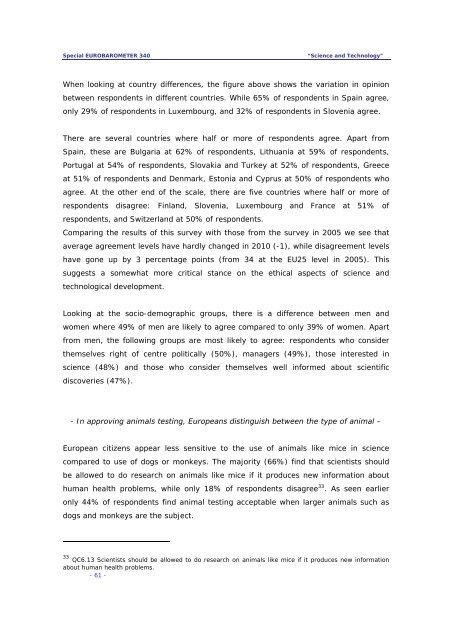ebs_340_en
ebs_340_en
ebs_340_en
Create successful ePaper yourself
Turn your PDF publications into a flip-book with our unique Google optimized e-Paper software.
Special EUROBAROMETER <strong>340</strong> “Sci<strong>en</strong>ce and Technology”<br />
Wh<strong>en</strong> looking at country differ<strong>en</strong>ces, the figure above shows the variation in opinion<br />
betwe<strong>en</strong> respond<strong>en</strong>ts in differ<strong>en</strong>t countries. While 65% of respond<strong>en</strong>ts in Spain agree,<br />
only 29% of respond<strong>en</strong>ts in Luxembourg, and 32% of respond<strong>en</strong>ts in Slov<strong>en</strong>ia agree.<br />
There are several countries where half or more of respond<strong>en</strong>ts agree. Apart from<br />
Spain, these are Bulgaria at 62% of respond<strong>en</strong>ts, Lithuania at 59% of respond<strong>en</strong>ts,<br />
Portugal at 54% of respond<strong>en</strong>ts, Slovakia and Turkey at 52% of respond<strong>en</strong>ts, Greece<br />
at 51% of respond<strong>en</strong>ts and D<strong>en</strong>mark, Estonia and Cyprus at 50% of respond<strong>en</strong>ts who<br />
agree. At the other <strong>en</strong>d of the scale, there are five countries where half or more of<br />
respond<strong>en</strong>ts disagree: Finland, Slov<strong>en</strong>ia, Luxembourg and France at 51% of<br />
respond<strong>en</strong>ts, and Switzerland at 50% of respond<strong>en</strong>ts.<br />
Comparing the results of this survey with those from the survey in 2005 we see that<br />
average agreem<strong>en</strong>t levels have hardly changed in 2010 (-1), while disagreem<strong>en</strong>t levels<br />
have gone up by 3 perc<strong>en</strong>tage points (from 34 at the EU25 level in 2005). This<br />
suggests a somewhat more critical stance on the ethical aspects of sci<strong>en</strong>ce and<br />
technological developm<strong>en</strong>t.<br />
Looking at the socio-demographic groups, there is a differ<strong>en</strong>ce betwe<strong>en</strong> m<strong>en</strong> and<br />
wom<strong>en</strong> where 49% of m<strong>en</strong> are likely to agree compared to only 39% of wom<strong>en</strong>. Apart<br />
from m<strong>en</strong>, the following groups are most likely to agree: respond<strong>en</strong>ts who consider<br />
themselves right of c<strong>en</strong>tre politically (50%), managers (49%), those interested in<br />
sci<strong>en</strong>ce (48%) and those who consider themselves well informed about sci<strong>en</strong>tific<br />
discoveries (47%).<br />
- In approving animals testing, Europeans distinguish betwe<strong>en</strong> the type of animal –<br />
European citiz<strong>en</strong>s appear less s<strong>en</strong>sitive to the use of animals like mice in sci<strong>en</strong>ce<br />
compared to use of dogs or monkeys. The majority (66%) find that sci<strong>en</strong>tists should<br />
be allowed to do research on animals like mice if it produces new information about<br />
human health problems, while only 18% of respond<strong>en</strong>ts disagree 33 . As se<strong>en</strong> earlier<br />
only 44% of respond<strong>en</strong>ts find animal testing acceptable wh<strong>en</strong> larger animals such as<br />
dogs and monkeys are the subject.<br />
33 QC6.13 Sci<strong>en</strong>tists should be allowed to do research on animals like mice if it produces new information<br />
about human health problems.<br />
- 61 -


